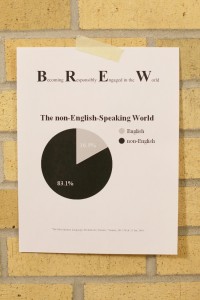
In an email sent to Concordia faculty and alumni on Jan. 29, Concordia President William Craft officially announced program changes designed to remedy the $2.7 million budget shortfall. Minutes later, Concordia Dean Eric Eliason sent a similar email to students.
The emails said nine majors will no longer be offered to incoming students: classical studies, classics, Latin, Latin education, French, French education, German and the self-standing health and humanities majors. The Scandinavian studies concentration within the Global Studies major will also be closed. No further majors, minors or concentrations will be closed during this year’s budget cycle.
Academic Affairs separately emailed the 38 students currently studying under these majors and concentration, 12 of whom will graduate in May.
These emails assured them that they would graduate as planned with their chosen degrees — the selected majors have only closed to incoming students.
After these announcements, SGA President Tanner Knutson and Vice President Rachel Schauer emailed students, inviting them to visit a Q&A site developed specifically for these program changes. According to the Q&A page, “the College has options to assist these students, including courses by arrangement, independent studies, and substitution of requirements.” The site can be found here.
The Q&A page revolving around this issue states existing cuts were made “among majors experiencing significantly decreasing enrollment. … Resources were prioritized to support programs with the potential to contribute to our enrollment and retention goals.” At the bottom reads “The work of identifying the full set of decisions related to staffing in academic programs will be completed in February.”

On Jan. 30, The Forum published an article on the cuts. However, Dr. Mary Rice, Concordia’s chair of World Languages and Culture, claimed the article left students, faculty and alumni with more questions than answers.
“The Forum made it sound like we were eliminating the programs altogether,” Rice said.
She said the Forum’s use of the word “programs” gave little detail regarding the departments responsible for these majors and how they will change. Though nine majors have been discontinued, Concordia will continue to offer minors in French, German and classics. Moreover, she said current students can still claim any of the nine closed majors, but the language portion of the Scandinavian concentration will only be offered for another year, as Dr. Milda Halvorson’s position will thereafter be terminated.
“This is the last opportunity for students to learn Norwegian,” Rice said. “Next year is the time to do it.”
Rice said Halvorson, associate professor of Norwegian, marks one of three tenured faculty members within the world language department who must leave Concordia after the 2016-17 academic year. The positions of Dr. Stephan Grollman, associate professor of German, and an undisclosed faculty member of the French department will also be terminated then.
Likewise, Dr. Heather Gruber, classical studies department chair, said Concordia will eliminate two positions at the end of this academic year: Dr. C. McKenzie Lewis, associate professor, is untenured and will not be given a year’s notice, and the other undisclosed faculty member has chosen to accept Concordia’s early retirement policy.
Both Gruber and Rice said the faculty changes do not suggest poor performance of any of the mentioned faculty members — the college made decisions based on seniority and necessity.
“No one is being terminated for the quality of their work,” Rice said. “Just people with the least seniority.”

Despite the cuts, Rice said the German and French departments will be “reconfigured.” These new, revamped majors would be taught by the remaining faculty, specifically Dr. Gay Rawson, professor of French, and Dr. Jon Clark, associate professor of German. With luck, the reconfigured French and German majors would take effect before the release of the 2016-17 course catalogue.
“They would be modeled after the Chinese major,” Rice said, mentioning that the Chinese major is taught solely by Dr. Tau Ming, associate professor of Chinese. “Hopefully, the new catalogue will never have to say ‘no new majors accepted.’ We have the possibility of still giving our students a high-quality French and German major.”
But even with rebooted majors, Rice said the lack of faculty will take its toll on both Concordia and the surrounding Tri-College schools, which haven’t offered French, German or classical studies majors for years.
“[Downsized departments] are devastated by the fact that they’ll be cut back to one faculty member,” Rice said. “It’s always better for students to learn from more than one person. They get more perspective.”
Gruber said the classical studies department currently has no official plans to reconfigure any of the department’s closed majors, but will likely push towards reconfiguration soon.
“As of May first, classical studies will be a one-person department — that’s me,” Gruber said. “This will entail redesigning a whole new curriculum. I’m confident that I’ll be able to offer a whole list of courses, but I don’t know what that looks like yet. There are classes I simply can’t offer, like the archeology classes.”
Though Rice and Gruber said they intend to develop their departments further, they remain critical of Concordia’s decision.
“It’s very sad that the college doesn’t stand behind languages,” Rice said, claiming that though Concordia hosts the Language Villages, they aren’t comparable. “They do a fabulous job at what they do, but what we do and they do are vastly different. They don’t have the depth of college language courses.”

